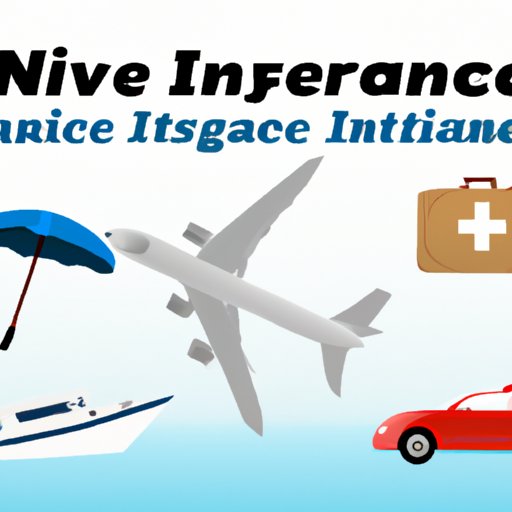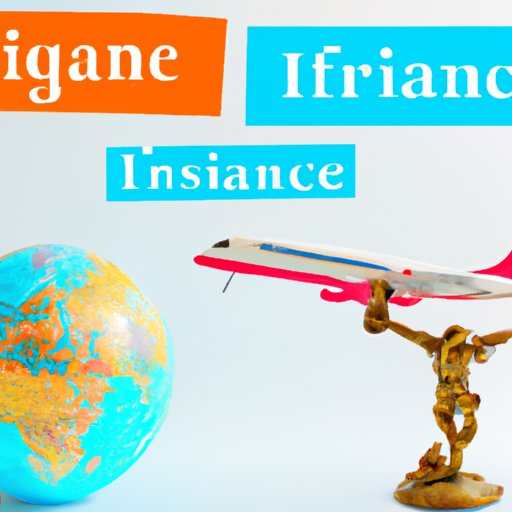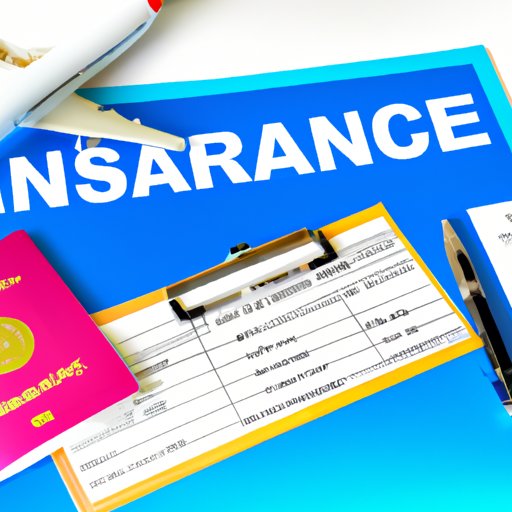Introduction
Travel insurance is a type of insurance designed to cover unexpected losses incurred while travelling. It can provide financial protection in the event of an accident, illness, lost luggage, or other unforeseen expenses. The purpose of travel insurance is to provide peace of mind for those who are travelling, allowing them to enjoy their trips without worrying about the potential costs of an emergency. However, it is important to understand what travel insurance does and does not cover in order to make an informed decision about purchasing a policy.

Common Misconceptions about Travel Insurance Coverage
Many people assume that travel insurance will cover any expense related to their trip, but this is not always the case. It is important to read the terms of your policy carefully before making a purchase in order to understand what is and is not covered. Generally speaking, travel insurance will cover medical expenses, trip cancellation, lost or stolen luggage, and other unexpected costs. However, there are certain events that are typically excluded from most policies, such as pre-existing medical conditions, intentional damage, extreme sports, and natural disasters.
What Types of Events Are Not Covered Under Travel Insurance?
Pre-existing medical conditions: Most travel insurance policies do not cover pre-existing medical conditions. This means that if you have a medical condition prior to purchasing a policy, any medical expenses associated with that condition will not be covered by the policy. It is important to disclose any pre-existing medical conditions when applying for a policy, as otherwise the insurer may deny any claims related to that condition.
Intentional damage: Intentional damage caused by the insured is not generally covered under travel insurance policies. This includes any damage caused by recklessness or negligence, such as leaving a hotel room in an excessively messy state or damaging rental property.
Extreme sports: Many travel insurance policies do not cover injuries sustained while participating in extreme sports, such as skydiving, bungee jumping, or rock climbing. If you plan on engaging in any of these activities while travelling, it is important to check the terms of your policy to ensure that you are covered.
Natural disasters: Natural disasters such as earthquakes, floods, or hurricanes are generally excluded from travel insurance policies. If you are travelling to an area prone to natural disasters, it is important to check the terms of your policy to see if you are covered in the event of an emergency.
Understanding the Exclusions in Your Travel Insurance Plan
In order to make sure you are adequately protected, it is important to read and understand the terms of your policy before purchasing travel insurance. Pay close attention to the exclusions section of the policy, as this is where you will find the events and circumstances that are not covered by the policy. Knowing what is excluded from your policy will help you make an informed decision about whether or not a particular policy is right for your needs.

The Pros and Cons of Buying Travel Insurance
Buying travel insurance can be a beneficial investment, as it can provide financial protection in the event of an emergency. According to a survey conducted by Allianz Global Assistance, 71% of respondents said that they felt more secure and less worried about their trip when they had travel insurance. Additionally, research conducted by the US Travel Insurance Association (UStiA) found that travellers who purchased travel insurance were reimbursed an average of $1,096 for medical care, trip cancellations, and other emergency services.
However, it is important to weigh the pros and cons of buying travel insurance before making a purchase. In some cases, the cost of the policy may outweigh the benefits, so it is important to assess your needs and compare different plans before making a decision. Additionally, some policies may exclude certain types of events or circumstances, so it is important to read and understand the terms of the policy before purchasing a policy.

How to Choose the Right Travel Insurance Plan for Your Trip
When choosing a travel insurance plan, it is important to assess your needs and compare different plans in order to make an informed decision. First, consider the type of coverage you need. Do you want a basic plan that covers medical expenses and trip cancellations, or do you need a more comprehensive policy that covers a wider range of events? Next, compare the terms and benefits of different policies in order to determine which one is the best fit for your needs.
It is also important to read and understand the terms of your policy before purchasing a plan. Pay close attention to the exclusions section of the policy, as this is where you will find the events and circumstances that are not covered by the policy. Understanding the exclusions will help you make an informed decision about whether or not a particular policy is right for your needs.
Conclusion
Travel insurance can be an invaluable asset when travelling abroad. However, it is important to understand what is and is not covered under travel insurance policies in order to make an informed decision about purchasing a policy. Pre-existing medical conditions, intentional damage, extreme sports, and natural disasters are typically excluded from most policies, so it is important to read and understand the terms of your policy before purchasing travel insurance. By assessing your needs and comparing different plans, you can make an informed decision about which policy is best for your needs.
(Note: Is this article not meeting your expectations? Do you have knowledge or insights to share? Unlock new opportunities and expand your reach by joining our authors team. Click Registration to join us and share your expertise with our readers.)
